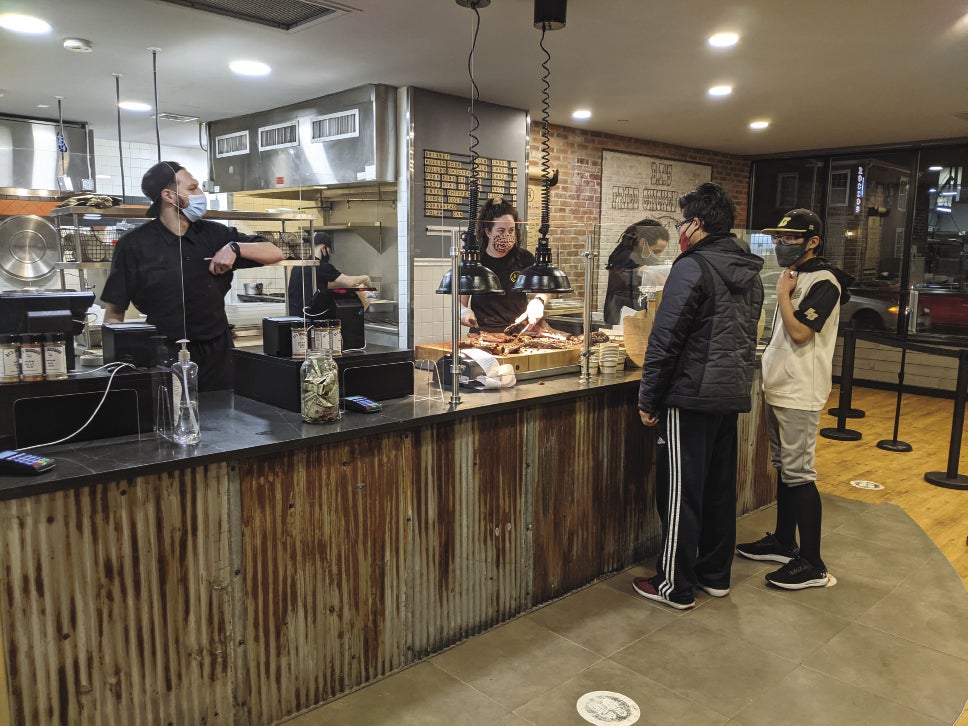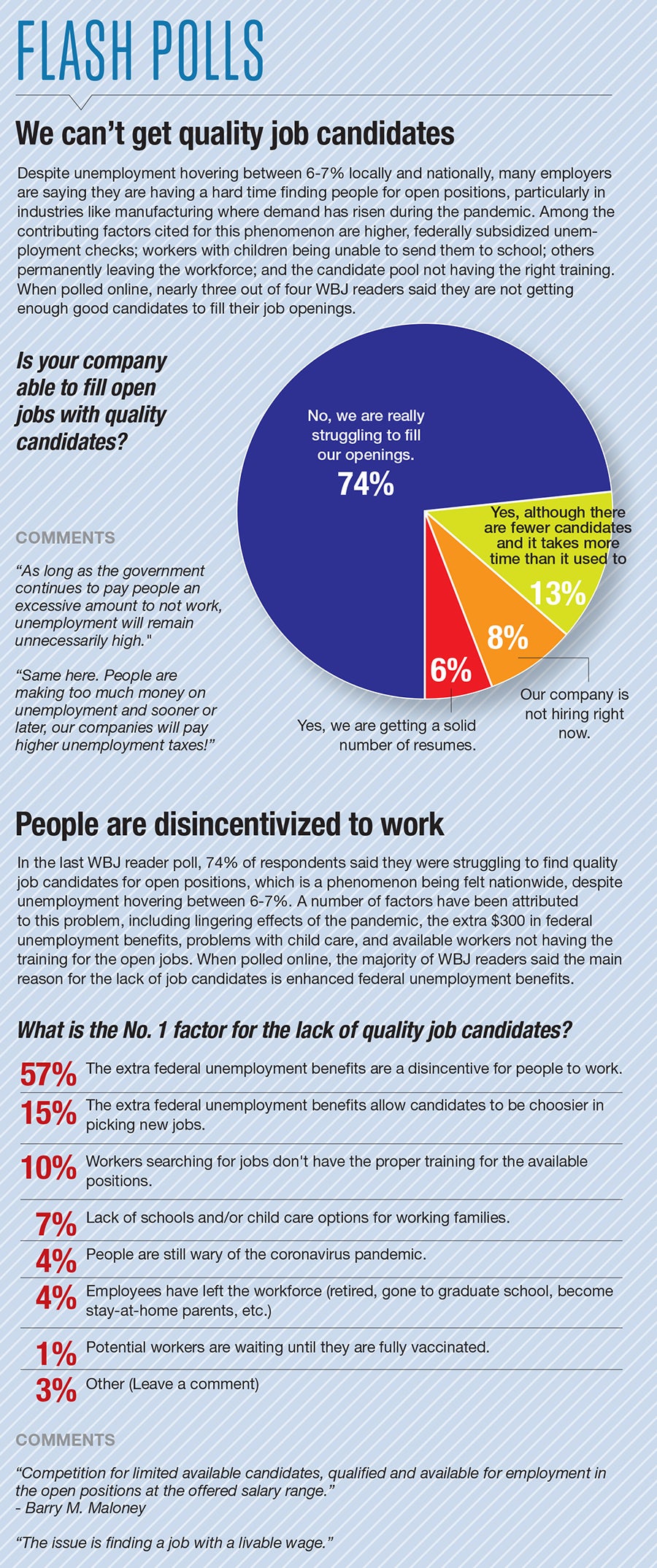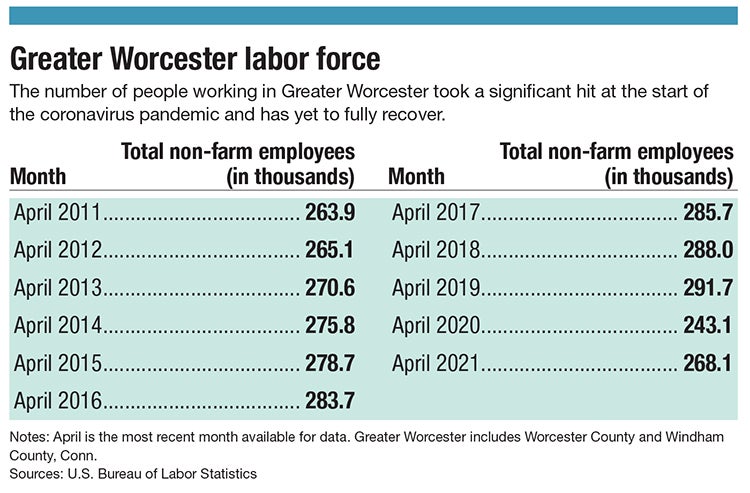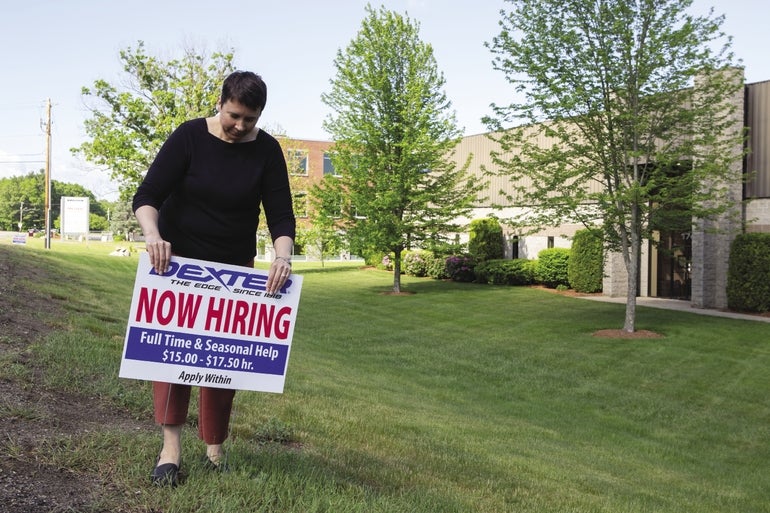As Central Massachusetts, and the nation, recovers from the sharpest recession in its history, companies around the region are coping with the same situation.
Get Instant Access to This Article
Subscribe to Worcester Business Journal and get immediate access to all of our subscriber-only content and much more.
- Critical Central Massachusetts business news updated daily.
- Immediate access to all subscriber-only content on our website.
- Bi-weekly print or digital editions of our award-winning publication.
- Special bonus issues like the WBJ Book of Lists.
- Exclusive ticket prize draws for our in-person events.
Click here to purchase a paywall bypass link for this article.
For Southbridge cutlery manufacturer Dexter-Russell, a post-pandemic jump in demand is already here. Human Resources Manager April Ullrich said orders have been ramping up fast since late last year. The company needs to add a second shift to meet them, but it’s struggling to find enough people to hire.
“I’m clamoring for employees,” Ullrich said.
Normally, she said, the company is known as an employer of choice in the local area. The production-floor jobs pay $15 to $17.50 with a full-benefits package. But, despite taking part in job fairs, advertising everywhere, giving bonuses to current employees who refer workers for jobs, and bringing on a second employment agency to complement the one they usually use, the demand for the jobs just isn’t there.
As Central Massachusetts, and the nation, recovers from the sharpest recession in its history, companies around the region are coping with the same situation. Maedon Coburn, owner of Appleseed Personnel Service Inc. in Leominster, has been matching workers with jobs for 30 years.
“I have seen recessions,” she said. “I’ve lived through 9/11. I’ve seen it all, and this is the worst I’ve ever seen.”

Coburn said the employers she works with, many also in manufacturing, have all raised their wages. Some have added sign-on bonuses and 30-day bonuses as well. Coburn believes some potential employees are still worried about exposure to COVID-19, since as of mid-May about 40% of people in Worcester County were fully vaccinated.
But she also said the current level of unemployment benefits, including an extra $300 weekly thanks to federal COVID relief, is making some people who lost their jobs during the pandemic reluctant to get back to work. The higher unemployment payments, combined with the savings from not commuting and possibly part-time side gigs, makes taking a job in the $15/hour range unappealing. They may not realize unemployment benefits are taxable, so in many cases the money normally automatically deducted from a paycheck must be paid back at tax time.

Getting people back to work
Employers are calling for changes to state policy they think could get more people into the labor market.
“Hiring has been difficult. We struggle like many other companies to attract talent,” said Celina Rosa, human resources manager at Imperial Distributors in Worcester. “Now with the reopening of restaurants, we are competing for the same pool of workers. It would help if Massachusetts, like other states, provided a return-to-work bonus.”
The $300 federal stipend is set to expire in early September, and there are already some provisions for those who get hired to continue receiving part of their unemployment benefits. But the state Senate in May rejected a proposal to give bonuses to those who return to work.
Still, Jeffrey Turgeon, executive director of the MassHire Central Region Workforce Board, said unemployed people sitting on their couches are probably not to blame for a large part of the hiring squeeze.
“I do hear from employers the grumblings, if you will, ‘They’re getting emergency benefits so maybe they don’t want to come back,’” he said. “I think that may be overblown.”

Of course, people have already gotten back to work. The Worcester County unemployment rate dropped from a high of 15.9% in April 2020 to 6% a year later. But prior to the COVID shock, it was hovering around 3%.
Turgeon said most people in the unemployment system are eager to get back to work, but some are still trying to figure out how to deal with the ways the pandemic disrupted their lives. For example, childcare centers are only now ramping back up to full capacity, so parents may not yet have a place to send their kids while they’re at work. He noted the competitive job market is giving workers more freedom to shop around.
“Job seekers can be a bit more choosy about what type of industry or what type of employer,” he said.
That’s a change from much of the 21st century so far, when the supply of workers often outpaced demand. That left workers limited choices and often prevented wages from keeping up with rising costs of living. For example, in inflation-adjusted terms, the median rent in Massachusetts climbed 17% between 2001 and 2018, while the household income of the median renter fell 3%, according to the Center on Budget and Policy Priorities.
Keeping wages high

When it comes to wages, though, employers worry about setting a standard eventually hurting their competitiveness. Caitlyn Carolan, president of the Worcester Restaurant Group, said many companies got money through the federal bailout Paycheck Protection Program.
“Part of what you need to spend that on is payroll, so people have money to pay several dollars more per hour,” she said. But, she added, “a year from now you still have to pay people the same amount. It’s just a matter of, can everybody sustain what they’re doing?”
Carolan said restaurants will eventually have to pass increases in their costs on to diners, which isn’t a popular prospect.
“I don’t think the customer wants to come in and spend $40 for a chicken dish,” she said.
But, she said, right now the priority is getting dining rooms back up to full capacity, whatever that takes.
“We’re exercising all our options,” she said. “We’re actively hiring for all positions.”

